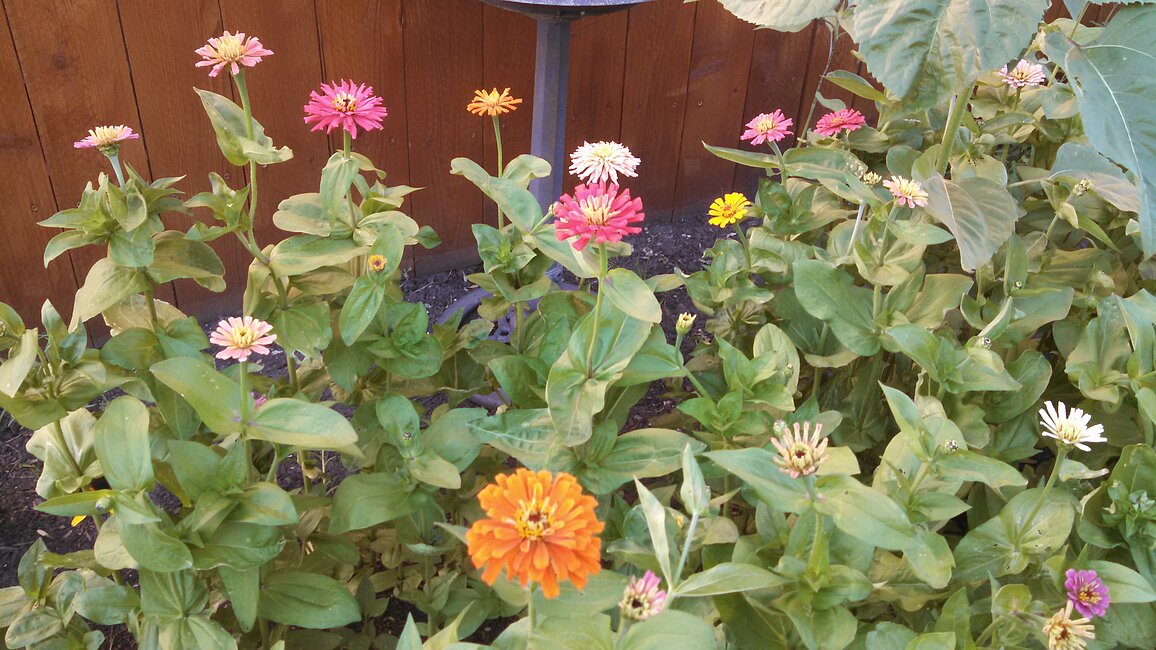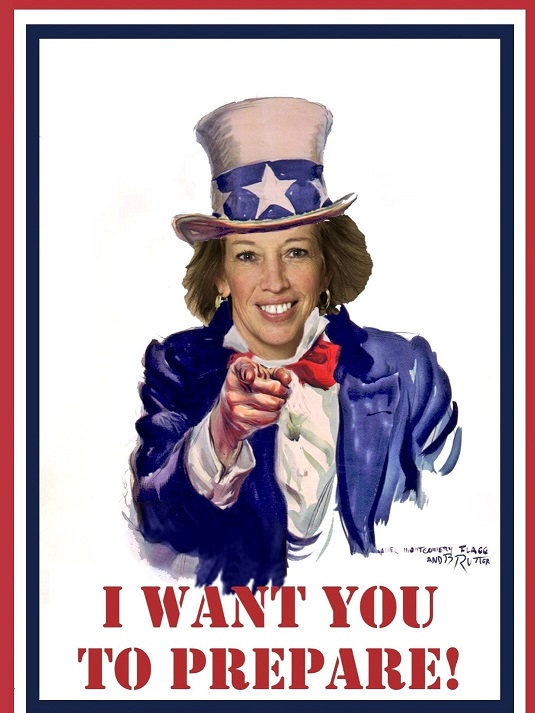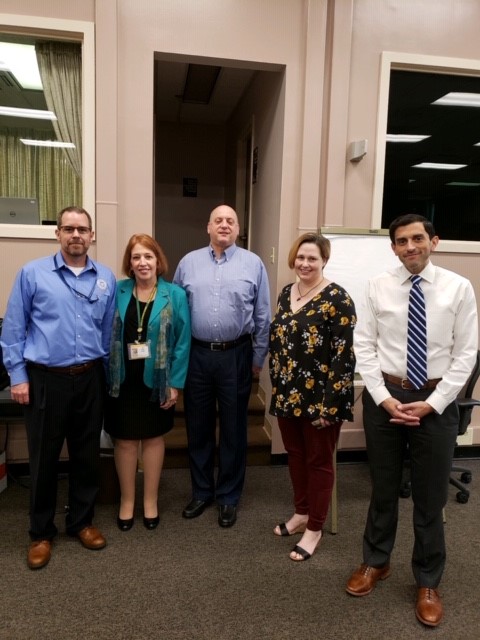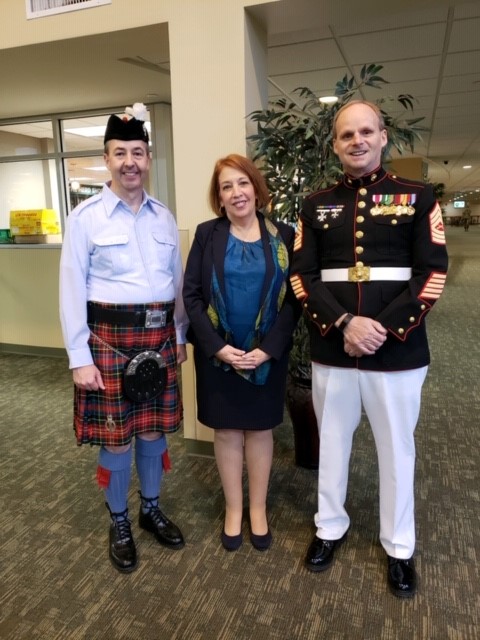Contact Information
Office Location: 428B12 Minard Hall
Office Phone: 701-231-5847
Email Address: carol.cwiak@ndsu.edu
Current Courses
- EMGT 222: Professional Development in Emergency Management
- EMGT 361: Disaster Preparedness
- EMGT 362: Disaster Mitigation
- EMGT 461/661: Business Continuity and Crisis Management
- EMGT 491/690: Strategies for Resilience: Innovative Problem Solving for FEMA
Get to Know: Carol's Contributions to the Academic Discipline and Profession
Rural Area Capacity and Capability White Paper, March 2024, Cwiak and Butterfass
2019-current, Ethics Special Interest Group, Co-Chair
Code of Ethics and Professional Conduct for Emergency Management Professionals
2010-2016, IAEM Training and Education Committee, Co-Chair
2014, Survey Research and Report Author, Emergency Management Higher Education Today: The 2014 FEMA Higher Education Program SurveyFederal Emergency Management Agency, Higher Education Program.
2014, Invited Facilitator and Report Writer, Training and Education Synergy Working Group, Federal Emergency Management Agency, Higher Education Program.
2008-2022, Organizer, Blanchard Award for Excellence in Emergency Management Higher Education.
2011, Framing the future: What should emergency management graduates know? Journal of Homeland Security and Emergency Management, 8 (2), Article 14.
2011, "Next steps in emergency management’s professionalization process: Who will be the gatekeeper of the profession of emergency management?" In J.A. Hubbard (Ed.), Challenges of emergency management in higher education: Planning and strategies. Fairfax, VA: Public Entity Risk Institute.
2010, "Emergency management higher education: A snapshot of the community". In J.A. Hubbard (Ed.), Integrating emergency management studies into higher education: Ideas, programs, and strategies. Fairfax, VA: Public Entity Risk Institute.
2007-2009, Invited Subject Matter Expert, FEMA Higher Education Focus Group on Emergency Management Principles/DoctrineFederal Emergency Management Agency, Higher Education Program.
Get to Know: Carol's Past Projects
- The New Normal: The Direct and Indirect Impacts of Oil Drilling and Production on the Emergency Management Function in North Dakota The study addressed in this report examined the type and extent of direct and indirect impacts of oil drilling and production on the emergency management function in North Dakota. The North Dakota State University student-faculty research team’s goal was to produce a report that advanced understanding, sharpened focus, and offered timely, significant recommendations to legislators, policy makers, and community planners regarding the changes and challenges oil drilling and production have brought to the emergency management landscape. The team took a two-pronged approach to accomplish its directive. The first prong involved objective assessment of existing articles, reports, data and industry projections from distinct topical areas (i.e., oil, socioeconomic, transportation, public health, fire, emergency medical services, and law enforcement) to help better understand and frame the impacts from an emergency management perspective. The second prong sought to engage the thoughts, observations, and opinions of emergency management and partner agency personnel in order to tell the story of impacts and potential solutions from their perspective. The work conducted in the first prong of the study coupled with study participants’ comments regarding impacts and recommendations helped frame the report’s 21 recommendations. Download the report. If you have any questions about the report, please contact Carol Cwiak at (701) 231-5847 or carol.cwiak@ndsu.edu.
- Ready Campus Initiative The NDSU Ready Campus Initiative was funded by the Department of Education (ED) Emergency Management for Higher Education (EMHE) grant program. This competitive grant is awarded only to Institutions of Higher Education (IHE) which exhibit a progressive vision for the integration of emergency management practices into their operational structures and demonstrate the capabilities and drive to successfully execute goals and objective unique to each IHE’s established needs.
- Ready Campus Initiative: Ready Campus Summit The Ready Campus Initiative (RCI) sponsored the Ready Campus Summit for Higher Education on Thursday September 30 and Friday October 1, 2010. The free conference focused on the importance of comprehensive emergency planning efforts and relationship building within a Higher Education framework. The conference also provided attendees with helpful planning strategies and materials to better protect lives, property, and sustain operations during a campus crisis. More than 80 individuals representing emergency management and higher education from 27 institutions/organizations in North Dakota, South Dakota, Minnesota, and Montana attended.
Get to Know: Carol
Why are you passionate about emergency management?
As I have often said, my love affair with emergency management began when I first met the county level emergency managers in North Dakota. That is when I came to understand that emergency management offers the perfect blend of service, care, pragmatism, and intellect and was the place where I belong. I have since had many opportunities to contribute at the local, state, national, and international level with a vast array of academics, practitioners, and leaders. But even more invigorating has been the opportunity to work with students just starting their journey in emergency management.
How do you translate that passion to your students in the classroom?
I try and remind students every day that the most important tools they bring to the table in emergency management are their intellect and their ability to create change. In their careers, whatever those careers will be, they will face complex and dynamic situations that will not have textbook answers; yet, they will work within social, economic, political, and ideological systems that we do know an awful lot about. I seek to build leaders with two feet on the ground, confidence in their own ability, an analytical lens that allows them to see and understand the dynamics of risk in all contexts, and an appreciation that there is much work and innovative thought still needed to further the emergency management agenda.
How would you best describe your teaching style?
The hallmarks of my teaching style are: engagement, trust, realism, humor, and expectation. I want students to know that I believe in them and therefore have expectations of them as students, future emergency management professionals, and as human beings. I try to foster and incorporate the thoughts and ideas of students into every element of the class to ensure that material “sticks” and they carry it forward with them into their career. I seek to build critical thinkers, effective communicators, and strong collaborators who understand the importance of the work they will be doing.
What excites you most about working with students in the emergency management program?
There are few academic disciplines that can be so sure of the potential impact its graduates will have on others. Emergency management affords our graduates the chance to touch others’ lives and wellbeing, while also helping organizations, businesses, and jurisdictions continue to function as they should. It is such an important mission and I know that each one of our graduates has the power to create a safer, more resilient country and world.
NDSU’s Department of Emergency Management is helping write the future of emergency management and is an exciting place to be. I feel honored to be a part of students’ journey; and, while I miss them when they leave us and move on to new adventures, I am excited for them because I know that they are rock stars who will carry forward the lessons they have learned at NDSU about themselves, emergency management, and life itself.
What should students bring to the table to be successful in emergency management classes?
Students need to bring a desire to learn and the confidence to contribute their thoughts and opinions in a learning environment. I place high value on trust, professionalism, and integrity and expect to see students further develop themselves on these fronts during their time with us. I also view humor as a great facilitator of learning, and I believe the ability to tie in new information into existing knowledge helps students better understand and remember concepts.
Understanding the complexities inherent in emergency management practice requires students’ brains to be alert, nimble, and flexible. Emergency management coursework requires engagement and a great deal of critical thinking – in short, it is a contact sport. Hence, students who want to be successful must be ready to power on their brains and bring their best self to classes day-in and day-out.
Why do you enjoy being on the faculty at NDSU?
I have enjoyed my time at NDSU and I particularly enjoy my fellow faculty in the Department of Emergency Management and our departmental assistant Kate Ulmer. Our department is a consensus-based department which means everyone has a say and a vote. This is not the case in all departments at NDSU or at all other colleges and universities. I recognize how fortunate our department has been to grow and develop in such a supportive environment (shepherded by to seasoned NDSU professors Drs. Klenow and Youngs). I feel blessed to have had the opportunity to work in such a friendly, hardworking, humor-filled department.
What are some things that you enjoy doing beyond the classroom?
The things I love most outside the classroom are time and travel with friends and family, theater, gardening, and spending time with my grandkids.
I place more value on experiences with people than things (not that I don’t have a lot of things – have you visited my office?). My travel has more to do with the people than the places, but I am drawn to the ocean in almost all my trips. I find nature tremendously soothing, but I don’t hunt, camp, fish, or hike. I just soak it in and then go back to my hotel (nature is a day trip).
I admit, I have become a bit obsessed with Broadway musicals over the past year or so. My son and daughter-in-law’s move to New York City has greatly contributed to that obsession. Dan Klenow and I now share restaurant, lodging, and Broadway show tips as his son also lives in New York City.
I relish our short summers because it allows me to get out in my flower garden. I find gardening very relaxing and fulfilling. The favorite item I grow each year are freaky zinnias, the seeds for which I was originally given by my now departed friend Barbara Wang (B-Dubya).
And as for my grandkids - it is said that grandkids are the gift you get for surviving your children as teenagers – and I cherish them as the gift they are (and I give them messy and loud toys to exact revenge on their parents for being trying teenagers).








